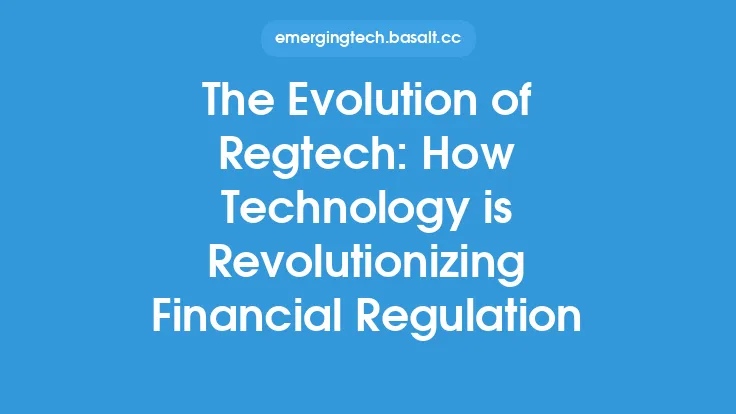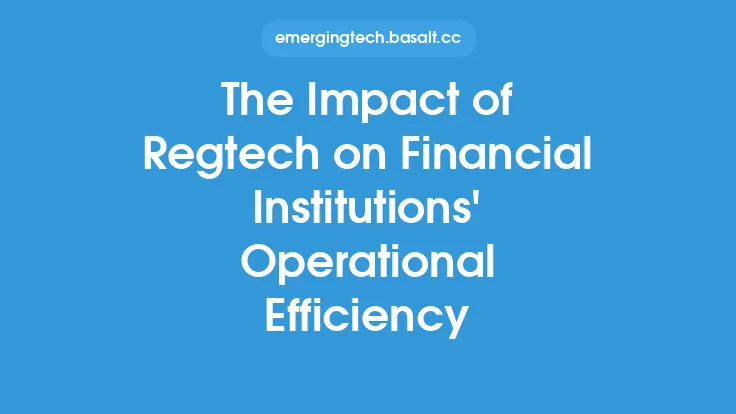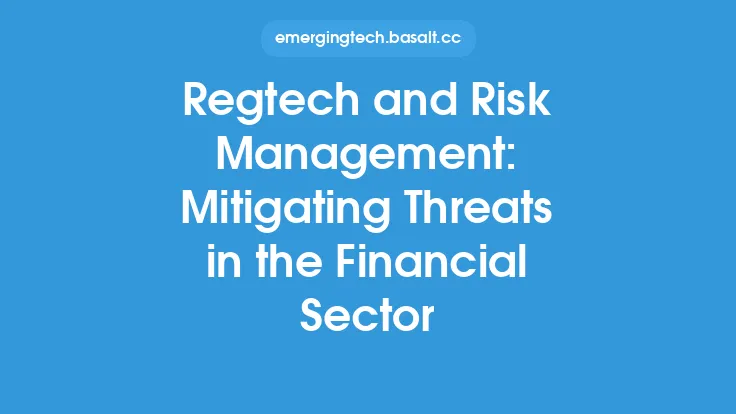The integration of artificial intelligence (AI) and regtech (regulatory technology) is revolutionizing the financial sector by enhancing the efficiency and effectiveness of regulatory compliance. Regtech, a subset of fintech, refers to the use of technology to facilitate regulatory compliance and reporting. The combination of regtech and AI has the potential to transform the way financial institutions approach regulatory requirements, making it easier for them to navigate the complex and ever-changing landscape of financial regulations.
Introduction to Regtech and AI
Regtech and AI are two distinct fields that have converged to create a new paradigm in financial regulation. Regtech involves the use of technology to streamline regulatory compliance, reporting, and risk management. AI, on the other hand, refers to the development of computer systems that can perform tasks that typically require human intelligence, such as learning, problem-solving, and decision-making. The integration of regtech and AI enables financial institutions to automate regulatory compliance, reduce the risk of non-compliance, and improve their overall operational efficiency.
Key Components of Regtech and AI
The key components of regtech and AI include natural language processing (NLP), machine learning (ML), and predictive analytics. NLP enables computers to understand and interpret human language, allowing them to extract relevant information from regulatory texts and other sources. ML involves the use of algorithms to analyze data and make predictions or decisions. Predictive analytics involves the use of statistical models to forecast future outcomes based on historical data. These components work together to enable regtech and AI systems to analyze large amounts of data, identify patterns, and make predictions about regulatory compliance.
Applications of Regtech and AI
The applications of regtech and AI are diverse and far-reaching. Some of the most significant applications include regulatory reporting, risk management, and compliance monitoring. Regtech and AI systems can analyze large amounts of data to identify potential risks and vulnerabilities, enabling financial institutions to take proactive measures to mitigate them. They can also automate regulatory reporting, reducing the risk of errors and non-compliance. Additionally, regtech and AI systems can monitor compliance in real-time, enabling financial institutions to respond quickly to changes in regulatory requirements.
Benefits of Regtech and AI
The benefits of regtech and AI are numerous and significant. Some of the most notable benefits include improved efficiency, reduced risk, and enhanced compliance. Regtech and AI systems can automate many of the tasks involved in regulatory compliance, freeing up staff to focus on higher-value activities. They can also reduce the risk of non-compliance by identifying potential vulnerabilities and enabling financial institutions to take proactive measures to mitigate them. Additionally, regtech and AI systems can enhance compliance by providing real-time monitoring and analysis of regulatory requirements.
Challenges and Limitations of Regtech and AI
Despite the many benefits of regtech and AI, there are also several challenges and limitations that must be addressed. Some of the most significant challenges include data quality, regulatory uncertainty, and talent acquisition. Regtech and AI systems require high-quality data to function effectively, but many financial institutions struggle to provide this. Regulatory uncertainty can also make it difficult for regtech and AI systems to keep pace with changing regulatory requirements. Additionally, the talent acquisition and retention required to develop and implement regtech and AI systems can be a significant challenge for many financial institutions.
Future of Regtech and AI
The future of regtech and AI is exciting and rapidly evolving. As the technology continues to advance, we can expect to see even more innovative applications of regtech and AI in the financial sector. Some of the most significant trends that are likely to shape the future of regtech and AI include the increasing use of cloud-based solutions, the development of more sophisticated AI algorithms, and the growing importance of data analytics. As regtech and AI continue to evolve, we can expect to see even more efficient, effective, and innovative solutions for regulatory compliance and risk management.
Implementation and Integration of Regtech and AI
The implementation and integration of regtech and AI require careful planning and execution. Financial institutions must first assess their regulatory compliance needs and identify areas where regtech and AI can add value. They must then develop a strategy for implementing regtech and AI systems, including the acquisition of necessary talent and technology. The integration of regtech and AI systems with existing infrastructure and processes is also critical, as is the development of a plan for ongoing maintenance and updates. By taking a thoughtful and strategic approach to the implementation and integration of regtech and AI, financial institutions can unlock the full potential of these technologies and achieve significant benefits in terms of efficiency, risk reduction, and compliance.
Conclusion
In conclusion, the integration of regtech and AI is transforming the financial sector by enhancing the efficiency and effectiveness of regulatory compliance. The key components of regtech and AI, including NLP, ML, and predictive analytics, enable financial institutions to automate regulatory compliance, reduce the risk of non-compliance, and improve their overall operational efficiency. While there are challenges and limitations to the adoption of regtech and AI, the benefits are significant and far-reaching. As the technology continues to evolve, we can expect to see even more innovative applications of regtech and AI in the financial sector, enabling financial institutions to navigate the complex and ever-changing landscape of financial regulations with greater ease and confidence.





